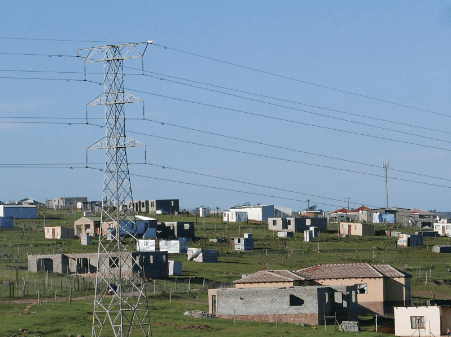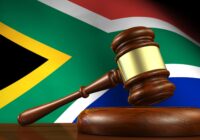In spite of its dismal record, the majority of black South Africans will most likely support the African National Congress (ANC) when the general election is held later this year. The ANC’s record is one of failure: a failure to provide jobs (about 60% of the country’s youth are unemployed), of failing to keep the lights on or even water flowing out of taps in parts of the country and of failing to curb corruption. Sadly, corruption in ANC-ruled South Africa has become pervasive and endemic.
Who can forget that Jacob Zuma, the former president, faces 700 allegations of corruption, fraud, money-laundering and racketeering charges but is yet to be tried in court? Instead, the ANC has finally admitted this week that the party lied to parliament when it described a publicly-funded swimming pool at Zuma’s private villa as a “fire pool” installed as a safety feature!
This year’s election will be tougher for the ANC than the earlier ones. Most recent polling shows that the party will get fewer than 50% of the votes. In South Africa’s proportional representation system, this means that the ANC will have to look for allies to continue governing. One outlier poll suggests that the ANC’s vote share would fall to just 33%.
Rural realities and why the ANC pitch resonates
The black African population, upon which the ANC relies, still turns out and votes for the party, particularly in the rural areas. Under apartheid, the countryside, termed “homelands” or “Bantustans” were dumping grounds for black Africans. They could only legally leave these arrears if they could get one of the rare tightly-controlled permits. Today no such restrictions apply and there has been a migration to the cities. Yet the rural areas are still home to a third of the population.

It is here that the people still vote for the ANC in huge numbers. They have not forgotten the party that led the fight to liberate them from apartheid. The ANC-led government also brought electricity to remote areas of the country, built homes across hillsides and, above all, provided them with social security benefits. Entire families, often unable to find work, came to rely on the small, but vital payments to family members who are disabled or retired.
The maximum monthly state pension stands at 2 090 rand per month. That is just $122, but it keeps whole families from destitution. Maintaining this pension is vital and the ANC understands this well.
When elections come around, the ANC plays to all its strengths. The party still derives legitimacy from its decades-long opposition to the apartheid government and its previous great leaders, especially Nelson Mandela. However, the ANC’s primary appeal is simple: it warns the poor that they will lose their social security if another party comes to power. This is untrue but truth no longer matters to the ANC in its pursuit of power.
The ANC has employed this cynical tactic over several elections. A survey by the University of Johannesburg’s Centre for Social Development in Africa (CSDA) carried out in the run-up to the 2014 election indicated that just under half of voters were not aware that the social grants that they received were theirs by right.
The centre’s director, Leila Patel, said the finding was “worrying” as it meant that these voters — 49% of the respondents — were not aware of their rights. The potential for political abuse is large, given that just under 16-million grant beneficiaries are receiving social grants amounting to R121bn this year. Agriculture MEC [Member of the Executive Council – provincial Minister] in KwaZulu-Natal, Meshack Radebe, for example, said in April that “those who receive grants and are voting for the opposition are stealing from the government”. He said that those who voted for another party should “stay away from the grant”, as if social grants were gifts from the ruling party. In fact, these grants are funded by taxes in order for the government to meet its constitutional obligation to provide social protection.
Summarising the study, Professor Yoland Sadie described the role of social grants in deciding voter behaviour as important, possibly decisive.
…social grants can provide an incentive for people to vote for the ANC, since a large proportion of grant-holders who support the party do not think that “they will continue receiving the grant when a new party comes to power.” A majority of respondents also agreed ‘that they would vote for a party that provides social grants’. Therefore, in a situation where one party has dominated the electoral scene for such a long time, and without having the experience of other parties being in power, it is difficult for voters to ‘know’ whether these benefits will continue under a different party in power – particularly if the official opposition has the legacy of being a “White” party.
Opposition tactics in 2024
The electorate has no shortage of parties to choose from in these elections. There will be more than 100 new political parties on the ballot, including ActionSA, the Patriotic Alliance, Rise Mzanzi. For the official opposition, the Democratic Alliance [DA], this will pose a challenge. The DA has its roots in the white, Progressive Party. For many years it fought apartheid with its sole Member of Parliament, Helen Suzman putting up doughty resistance to racist legislation. Bitterly attacked by the government for her stand, she won widespread international appreciation for her performance from 1961-1974.
Since the end of apartheid, the DA has gone through several leaders, some of them black. Today John Steenhuisen is leader of the party and, officially, of the opposition. As a white politician he can (and is) dismissed as representing an ethnic minority.
The DA has made no secret that it is organising a coalition of opposition parties to challenge the ANC. What Steenhuisen calls the “moonshot pact.” The ANC has used this to suggest to the electorate that, if elected, the DA will return to the policies of apartheid. ANC national chairperson Gwede Mantashe hinted as much when he accused Steenhuisen of organising “apartheid parties” to remove the ANC from power. “Steenhuisen is trying the impossible. He’s trying to organise all apartheid parties and parties of Bantustans to form a group that will defeat the ANC,” Mantashe said.
To resist these allegations the DA has now hit back. It is targeting the issue of benefits and grants, using a Tweet.

Steenhuisen is making a well targeted pitch. All South Africans know that their electricity supply has collapsed, the police seldom answer calls for help and unemployment has hit families hard. Will this pitch erode the ANC vote among key constituencies, including the rural communities? It is too early to tell.
The views expressed in this article are the author’s own and do not necessarily reflect Fair Observer’s editorial policy.
Support Fair Observer
We rely on your support for our independence, diversity and quality.
For more than 10 years, Fair Observer has been free, fair and independent. No billionaire owns us, no advertisers control us. We are a reader-supported nonprofit. Unlike many other publications, we keep our content free for readers regardless of where they live or whether they can afford to pay. We have no paywalls and no ads.
In the post-truth era of fake news, echo chambers and filter bubbles, we publish a plurality of perspectives from around the world. Anyone can publish with us, but everyone goes through a rigorous editorial process. So, you get fact-checked, well-reasoned content instead of noise.
We publish 2,500+ voices from 90+ countries. We also conduct education and training programs
on subjects ranging from digital media and journalism to writing and critical thinking. This
doesn’t come cheap. Servers, editors, trainers and web developers cost
money.
Please consider supporting us on a regular basis as a recurring donor or a
sustaining member.
Will you support FO’s journalism?
We rely on your support for our independence, diversity and quality.










Comment